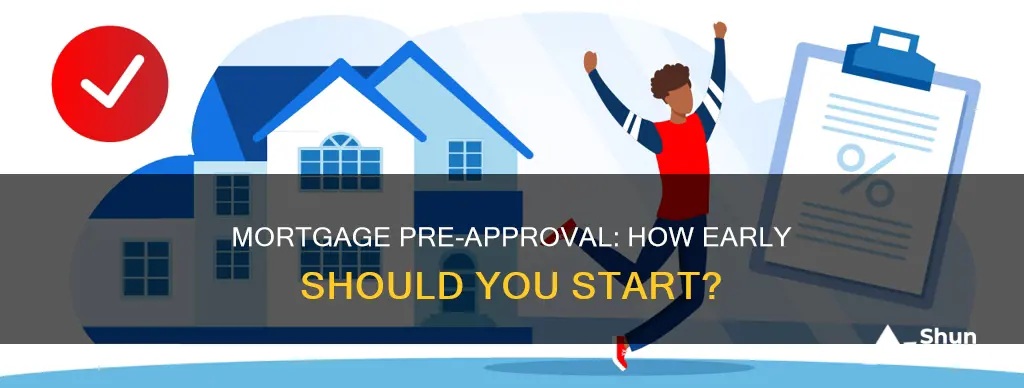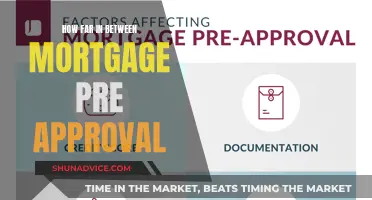
Getting a mortgage pre-approval is an important step in the home-buying process. It shows that you're a serious buyer and can help seal the deal. However, the timing of when to get pre-approved can be critical. It is recommended to get pre-approved for a mortgage before looking for a real estate agent or viewing homes to save time and money and make the process smoother. The best time to get pre-approved is between one and four months before buying a home, as it can take time to find the right property and negotiate the purchase. Pre-approval letters are typically valid for 90 days, but they may expire before you find your dream home, so it is important to consider the timing carefully.
| Characteristics | Values |
|---|---|
| When to get pre-approval | Between 1 and 4 months before buying a home |
| How long is pre-approval valid for? | 90 days, or 4 months from the date of the credit report check |
| What is the benefit of pre-approval? | Knowing your buying power, saving time, being taken seriously by sellers, negotiating better, closing faster |
| What is the downside of pre-approval? | A small drop in your credit score, unnecessary expenses if done too early |
| What is the pre-approval process? | Contact a lender, provide proof of identity, credit approval, income verification, down payment, records of debts and assets |
What You'll Learn

Pre-approval timing and its impact on credit scores
The timing of mortgage pre-approval can have a significant impact on your credit score and overall financial health. While getting pre-approved for a mortgage is a crucial step in the home-buying process, it is important to consider the timing to avoid unnecessary costs and complications.
Firstly, it is essential to understand that mortgage pre-approval is typically valid for a limited period, usually between 30 and 120 days. This period starts from the date the lender checks your credit report. Therefore, it is advisable to initiate the pre-approval process one to four months before buying a home. This timeframe allows you to explore different neighbourhoods, view multiple properties, and find the right home that meets your needs and preferences.
However, getting pre-approved too early in the house-hunting process can be wasteful. If your pre-approval letter expires before you find your dream home, you may need to reapply, incurring additional fees. Additionally, each pre-approval application triggers a hard inquiry on your credit report, resulting in a small, temporary drop in your credit score. Multiple applications within a short period could lead to multiple hard inquiries, further impacting your credit score.
On the other hand, applying for pre-approval too late in the process can also be detrimental. If you wait until you're ready to bid on a home, you may not have a clear understanding of your borrowing power, leading to rushed decisions or bids that don't align with your financial capabilities.
To optimize the timing of your mortgage pre-approval, it is recommended to start by getting pre-qualified. Pre-qualification is a less involved process that does not require a hard pull on your credit. This step can give you a general idea of your borrowing power without impacting your credit score. Once you are closer to making an offer, you can proceed with the pre-approval process, ensuring that your credit profile is as favourable as possible.
Mortgage Modifications: Understanding the Changes to Your Original Contract
You may want to see also

Pre-approval validity and expiration
The validity of a mortgage pre-approval letter is typically 90 days or three months, with some lenders offering validity for 120 days or four months. However, it is important to note that these letters have an expiration date, and if not used within the specified timeframe, they will expire. This is because mortgage pre-approvals are based on financial information, loan products, and market interest rates, which are subject to change. Therefore, it is advisable to initiate the pre-approval process less than four months before buying a house.
If your pre-approval letter expires before you find a suitable home, you will need to contact your loan officer and request an extension. The loan officer will ask for updated financial information, including income, assets, tax returns, and credit history, to determine if your pre-approval can be extended. It is recommended to reach out as soon as possible, as waiting too long may require undergoing the entire pre-approval process again.
Additionally, it is important to maintain a good credit score and avoid making any significant changes to your credit history during the pre-approval period. Any substantial changes to your credit score or the assumption of new debts may affect the terms of your mortgage pre-approval. Therefore, it is advisable to refrain from making significant financial changes until after the mortgage transaction has closed.
While the pre-approval letter is valid for a limited time, it is important to note that your house-hunting journey is not bound by the same expiration date. Even if your pre-approval expires, you can continue searching for a home and simply update your financial information with the lender when necessary. This will ensure that you remain a competitive buyer in the housing market.
In summary, while mortgage pre-approval letters typically expire after 90 to 120 days, this should not deter you from continuing your house hunt. By staying in communication with your lender and providing updated financial information, you can ensure that your pre-approval remains valid or is extended. This will enable you to confidently make offers on homes within your budget.
Canceling a Mortgage Contract: Is It Simple?
You may want to see also

Pre-approval requirements
The pre-approval process for a mortgage requires you to submit various documents to a lender, who will then verify the information and perform a credit check. Here are the key requirements and steps to obtain mortgage pre-approval:
- Proof of identity: Provide a copy of your passport or driver's license, along with your Social Security number.
- Credit approval: Authorize the lender to access your credit reports and scores. A good credit score is essential for favourable mortgage terms.
- Income verification: Submit pay stubs, bank statements, and tax returns for the past two years. Lenders use this information to assess your financial situation and calculate your debt-to-income ratio. If you are self-employed, provide additional documentation, such as year-to-date profit and loss statements.
- Down payment: Demonstrate access to cash, typically ranging from 5% to 20% of the potential home purchase price. Government-backed loans may allow for lower down payment amounts.
- Records of debts and assets: Lenders will assess your monthly debt obligations relative to your income. They will also consider your assets, such as investment accounts or property holdings.
- Employment history: Confirm that you have been employed consistently, either with the same company or in the same industry, for at least two years.
- Additional documentation: If you are self-employed, applying for a non-conforming loan, or using veteran benefits, further documentation may be required. For instance, a self-employed individual might need to provide a list of accounts receivable or 1099s. Applicants seeking a VA loan must include a Certificate of Eligibility (COE).
- Pre-approval letter: After submitting the required documentation and undergoing the lender's review, you will receive a pre-approval letter. This letter indicates the lender's willingness to offer you a mortgage up to a specified amount. It is typically valid for 90 days but may have an expiration date of 30 to 60 days.
It is important to note that pre-approval requirements may vary slightly between lenders, so it is always a good idea to consult with multiple lenders and understand their specific requirements.
Rental Property Income: New Mortgage Game-Changer?
You may want to see also

Pre-approval benefits
Pre-approval for a mortgage can be extremely beneficial when it comes to making an offer on a house. Here are some advantages of getting pre-approved:
Know your budget
Getting pre-approved gives you a clear understanding of what you can afford. It lets you know how much you can borrow based on your financial situation, including your income, credit score, assets, and debts. This helps you narrow down your home search to properties that fit within your budget, saving you time and effort.
Be taken seriously by sellers
A pre-approval letter indicates to sellers that you are a serious and credible buyer. In a competitive market, it can give you an edge over other buyers and increase the likelihood of your offer being accepted. Sellers will have confidence that you can secure the necessary financing, reducing the risk of the deal falling through due to unforeseen financial obstacles.
Move faster and close the deal
With a pre-approval, you can act quickly when you find a home you want to make an offer on. It also allows you to close the deal faster. Some lenders offer expedited closing processes for pre-approved buyers, helping you secure your dream home without delays.
Negotiate better
Being pre-approved strengthens your negotiating power. It demonstrates to sellers and real estate agents that your interest is genuine and that you are financially capable of making the purchase. This can put you in a better position to negotiate a favourable price and other terms.
Avoid unnecessary expenses
Applying for pre-approval at the right time can help preserve your credit score and spare you unnecessary expenses. While pre-approval is optional, it is particularly valuable in competitive housing markets, where it can make your offer more attractive to sellers.
Pre-Qualification Mortgage: Effective Strategy for Home Buyers
You may want to see also

Pre-approval and pre-qualification differences
Pre-qualification and pre-approval are both types of mortgage approvals that refer to steps that lenders take to verify that a client can afford a mortgage. However, they have distinct meanings and purposes.
Pre-qualification is a preliminary step to determine how much mortgage you could get. It is a less involved step, with fewer verification steps, and is based on data you submit, such as your income and expected down payment. It is a quick process that can be completed online, in person, or over the phone in just a few minutes. Pre-qualification is a good option for first-time homebuyers who want to establish their homebuying budget and get an idea of how much they can borrow. It is also useful for narrowing down lenders.
On the other hand, pre-approval means receiving conditional approval for the loan amount you plan to borrow. It gives a better estimate of what you can afford and verifies your financial information for a loan. It is a more involved step that signals what a lender can offer you, although it is not a guarantee. Pre-approval requires more documentation, such as proof of identity, income verification, credit approval, and records of debts and assets. It typically takes longer to obtain, with some lenders taking several weeks to process the application. Pre-approval gives you a competitive edge over other buyers in the market and shows sellers that you are a serious homebuyer.
It is important to note that the steps and terminology used can vary from lender to lender, and some may use "`pre-qualification`" and "`pre-approval`" interchangeably.
Regarding the timing of pre-approval, it is generally recommended to start the process between one and four months before buying a home. This allows enough time to explore different neighbourhoods, view multiple properties, and find the right home. Pre-approval letters are typically valid for a limited time, often 90 days, so getting pre-approved too early could result in the letter expiring before you find a home. It is also important to consider the potential impact on your credit score, as the credit check required for pre-approval generates a hard inquiry that can cause a small drop in your credit score.
Mortgage-Backed Securities: Boosting Economy Through Homeownership
You may want to see also
Frequently asked questions
Getting pre-approved for a mortgage is an important step in the home-buying process. It shows sellers that you are a serious buyer and that you can secure a mortgage, which makes it more likely that your offer will be accepted. It also helps you know how much you can borrow based on your financial situation.
It is recommended that you get pre-approved for a mortgage between one and four months before buying a home. This gives you enough time to explore different neighbourhoods and view multiple properties. However, mortgage pre-approval letters are only valid for a limited time, typically 90 days, but possibly as little as 60 days. So, if you get pre-approved too early, the letter could expire before you find a home.
Pre-qualification is an early step in the homebuying journey. It is a quick process that can be done online and gives you an estimate of what you might be able to borrow. Pre-approval, on the other hand, is a more specific estimate of what you could borrow and requires more documentation. It is as close as you can get to confirming your creditworthiness without having a purchase contract in place.
To apply for mortgage pre-approval, you will need to provide the lender with proof of identity, authorise them to access your credit reports and credit scores, provide income verification, and prove that you have access to cash for a down payment.







